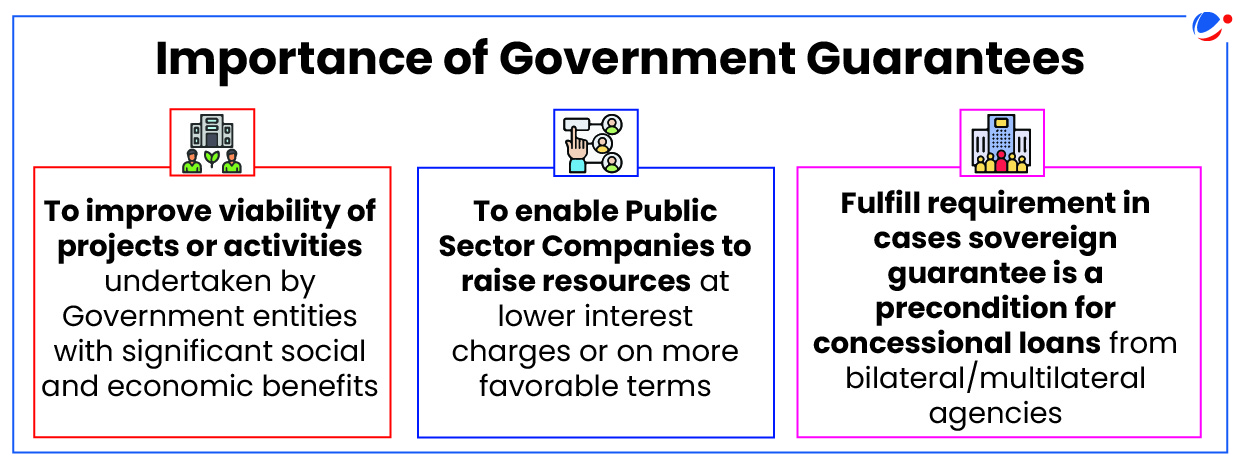Why in the news?
A working group constituted by the Reserve Bank of India (RBI) made certain recommendations to address issues relating to guarantees extended by State governments.
What is a State Government Guarantee?
- A ‘guarantee’ is a legal obligation for a State to make payments and protect an investor/lender from the risk of default by a borrower. Guarantees are usually sought when the investors/ lenders are unwilling to bear the risk of default.
- As Per the Indian Contracts Act (1872), it is a contract to “perform the promise, or discharge the liability, of a third person in case of his default.”
- Article 292 of the Constitution of India extends the executive power of the Union to the giving of guarantees on the security of the Consolidated Fund of India, within such limits, if any, as may be fixed by Parliament. Similar powers are given to States under Article 293.
- State Governments often issue guarantees on behalf of various PSEs/ Cooperative Institutions/Urban Local Bodies, etc. to various banks/financial institutions for financing developmental schemes/projects.
Current Status of State Government Guarantees
- Extent: State-wise guarantee data for the period 2018-21 suggests that outstanding guarantees constituted less than 10 % of their GSDP for the majority of the states. It has, however, been rising over the years for most of the states.
- The guarantee given by 27 states was 4% of their aggregate GSDP at the end of 2021-22.
- For several states, the power sector accounted for the largest share of guarantees.
- States with a relatively higher outstanding guarantee levels include Sikkim (12.0%), Telangana (12.0%), Andhra Pradesh (10.4%), and Uttar Pradesh (8.8%).
- Andhra Pradesh has provided significant guarantees to sectors of agriculture and water supply, sanitation, housing and urban development.

Issues Regarding State Guarantees
- Moral Hazards: Guarantees can sometimes cause a problem where the guaranteed party doesn't make optimal efforts to meet its obligations because it knows it's backed up by a state guarantee.
- Similarly, investors and lenders may have less incentive to perform due diligence in scrutinizing the project.
- Fiscal Risks: Contingent liabilities are a risk to State Governments owing to the large outstanding debt and losses of PSEs. It may burden the state finances leading to large unanticipated cash outflows and increased debt.
- Crowding Out Private Investment: Excessive use of guarantees can discourage private lenders from directly financing projects, potentially leading to higher borrowing costs for the government and state entities.
- Lack of Uniformity: Some states have fixed ceilings in terms of annual incremental risk-weighed guarantees, while others have fixed in terms of total outstanding guarantees.
- There is also a lack of uniformity in terms of variable (s) to which these ceilings are linked, viz. certain percentage of either total revenue receipts or GSDP.
- Transparency and Accountability: Limited disclosure about the specific purpose, terms, and conditions of guarantees may raise concerns about transparency and accountability.
- Management of Guarantees: The quantum and timing of potential costs / cash outflows owing to guarantees are often difficult to estimate (due to unavailability of data). Accordingly, their management is difficult and is typically not reported in the budget deficit.
Way Forward - Major Recommendations of the Working Group
- Expanded Definition of Guarantee: The word ‘Guarantee’ should include all instruments, which create an obligation, contingent or otherwise, on the part of the State Government.
- There should not be any distinction made between Financial/ Performance guarantees while assessing risk.
- Also, the purpose for which Government guarantees are issued should be clearly defined.
- There should not be any distinction made between Financial/ Performance guarantees while assessing risk.
- Uniform Guarantee Ceiling: State Governments may consider fixing a ceiling for incremental guarantees issued during a year at 5 % of Revenue Receipts or 0.5 % of Gross State Domestic Product, whichever is less.
- Guarantee Fee: State Governments may consider charging a minimum guarantee fee for guarantees extended and additional risk premium may be charged based on the risk category and the tenor of the underlying loan.
- Risk Categorization: States should classify the projects/ activities as high risk, medium risk and low risk and assign appropriate risk weights before extending guarantees.
- Such risk categorization should also take into consideration past records of defaults.
- Guarantee Redemption Fund (GRF): The States which are currently not members of the GRF should consider becoming members at the earliest.
Guarantee Redemption Fund (GRF)
|
- Disclosure Standards: State Governments may publish/disclose data relating to guarantees, as per the Indian Government Accounting Standard (IGAS).
- RBI may consider advising the banks/ NBFCs to disclose the credit extended to state-owned entities, backed by State Government guarantees.
Guidelines for Guarantee Policy of Government of India (2022)
|






